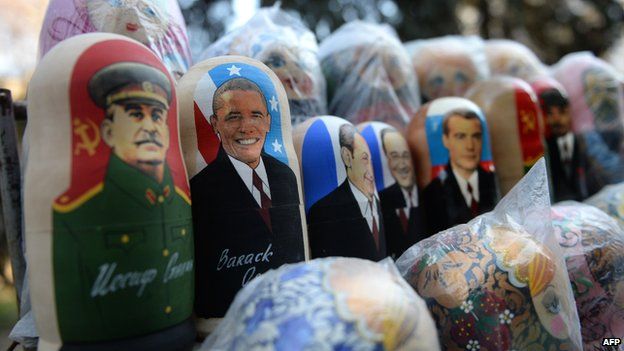Moldova election: Will voters choose EU or Putin?
- Published

Sunday's electoral contest between pro-Russian and pro-Western forces in Moldova has taken on an unprecedented, wider significance in the shadow of the crisis in neighbouring Ukraine.
What is at stake?
The former Soviet republic's governing pro-Western coalition is seeking closer ties with the European Union, but the Russian government is seen as piling on the pressure to sway Moldovans to change course.
In the summer, Moldova - along with Ukraine and Georgia - signed an association agreement on political and economic relations with the European Union. This angered Russia, which has called on Moldova to postpone the implementation of the free trade part of the deal, as Ukraine has since agreed to do.
Moscow says it is worried by a flood of cheap EU goods affecting its producers, but some observers believe its goal is to assert what it sees as Russia's natural sphere of influence in the post-Soviet region.
What action has Russia taken?
Russia has banned the import of agricultural products, including wine, meat, fruit and vegetables, dealing a severe blow to Moldova's economy - one of Europe's poorest, and heavily dependent on agricultural exports.
It has also made noises that it would support full independence for the Russian-backed breakaway region of Trans-Dniester if Moldova cosies up too closely to the West.
How has the tension affected the elections?
The Ukraine crisis has intensified the longstanding rivalry between pro-EU and Russian-leaning parties. Local media accuse pro-Russian parties of being financed by Moscow, and one of them has been barred from taking part in the election for alleged foreign funding.
The authorities have banned the broadcasting of several Russian state TV channels, accusing them of propaganda. The opposition says the move violates media freedom.
Who are the pro-EU forces?
Of the two governing parties, Prime Minister Iurie Leanca's Liberal Democratic Party - which is still led by Mr Leanca's predecessor, Vlad Filat - wants Moldova to achieve EU candidate status by 2017 and full membership by 2020. It has ruled out any coalition deals with the pro-Russian opposition.
Its coalition partner, the Democratic Party, which is controlled by tycoon Vlad Plahotniuc, is more moderately pro-European. It enjoys positive media coverage. Mr Plahotniuc is said to have a stake in two major TV channels.
The most strongly pro-EU and pro-Nato party, the Liberals, left the ruling coalition and went into opposition in 2013.
And the pro-Russian forces?
The main opposition party is the Communist Party - a Soviet-era survivor that still uses the hammer and sickle as its symbol.
While it insists it is not fundamentally opposed to EU integration, it has called for a review of the association agreement. More recently, its leader, Vladimir Voronin, has suggested that the Russian-led Eurasian Union offers more benefits.
Seen as rather staid, the Communists had been expected to lose votes to more radical, pro-Russian groups - Fatherland, and the Party of Socialists, which condemned the EU deal as "criminal". Their poll numbers were boosted by populist campaigning - including concerts by Russian pop singers.
But with only days to go until the vote, the electoral authorities had Fatherland excluded from the election, accusing it of receiving funding "from abroad". The party's leader, millionaire Renato Usatii, who denies the allegation, left Moldova for Russia, saying he feared arrest.
How does the system work?
Voters will elect a single-chamber 101-member parliament by a system of proportional representation. Parties need to gain at least 6% of the vote to win seats.
A majority in parliament is needed to form a government. Parliament also elects the president, but this will not happen until President Nicolae Timofti's term ends in 2016.
As in past elections, the breakaway Trans-Dniester region is not taking part.
Who can vote?
All Moldovans over 18 are eligible to vote - about 2.7 million people.
An estimated 700,000 Moldovans work abroad, mostly in Russia. Opposition parties have accused the authorities of trying to prevent Russia-based voters from taking part by failing to set up enough polling places there.
What is likely to happen?
The latest opinion polls give pro-EU forces the lead, but much will depend on the groups' exact strength and post-election horse-trading. The process can be difficult; parliament was once unable to elect a president for three years.
While a coalition of pro-EU parties seems the most likely outcome, there has been speculation that the Democrats and Communists - the moderate wings of the two sides - could work together.
BBC Monitoring reports and analyses news from TV, radio, web and print media around the world. You can follow BBC Monitoring on Twitter and Facebook.
- Published21 November 2013
- Published10 October 2014
- Published31 May 2023
- Published17 September 2014